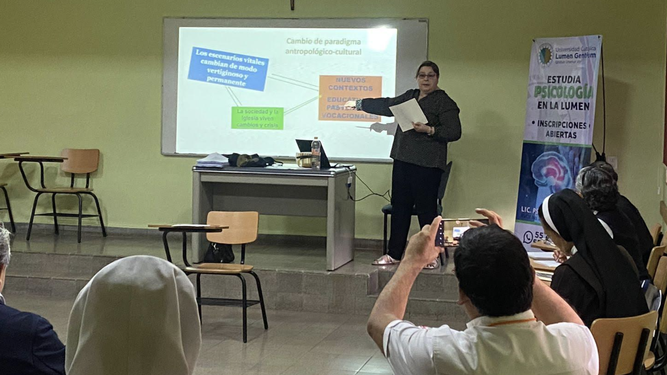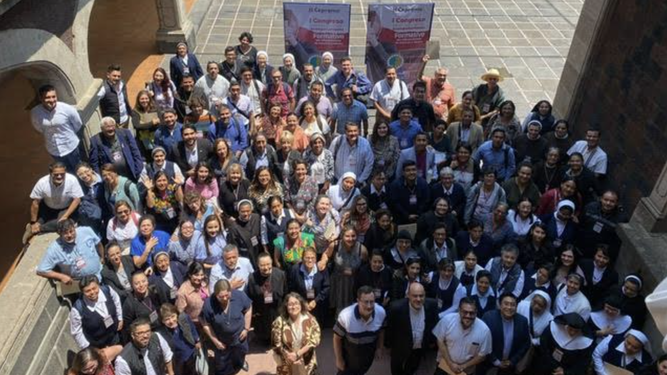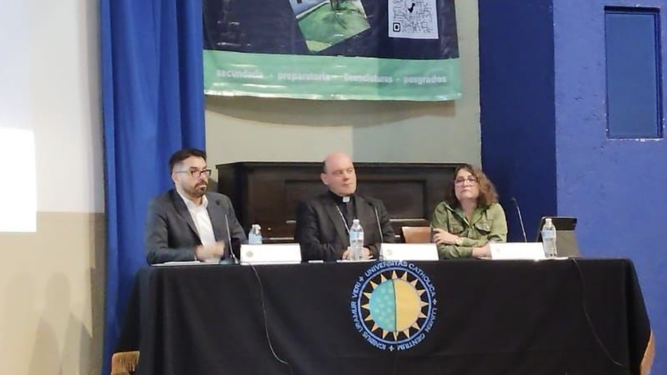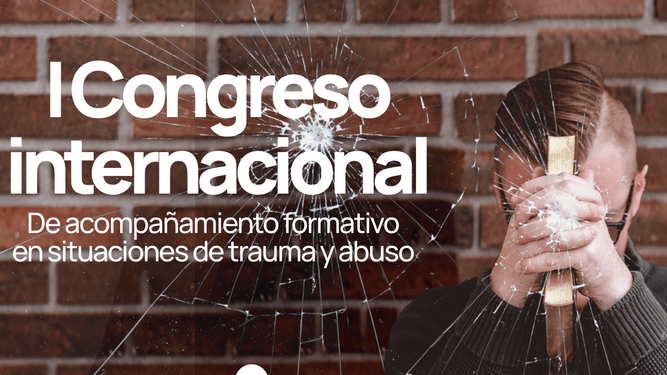“If our formation systems manage to accompany, heal and prevent these realities, our seminaries and houses of formation will experience a great structural change: from clerical introjection we will move towards lay accompaniment”
Monsignor Acero: “Accompanied by God, something essential in our life, and also accompanied by another person to distinguish what is one’s own and what belongs to the other person”
From July 18 to 20, at the Catholic University of the Archdiocese of Mexico City, the I International Congress of training accompaniment in situations of trauma and abuse who organized the Ceprome Latin America and the Lumen Gentium University of the Archdiocese of Mexico.
The more than two hundred attendees In a hybrid way, they were able to reflect together on the effects of trauma and abuse on psychological, existential and spiritual development, on psychological and formative accompaniment in formation houses in situations of trauma and abuse in childhood and adolescence, in addition to the gender perspective and the guidelines for spiritual accompaniment in formation houses in these situations.
The participants were able to participate in various workshops on early detection in educational centers on situations of trauma and abuse in childhood and adolescence, directed by Dr. Patricia Espinosa.
The lic. Susana Gonzalez led a workshop on the accompaniment protocol in women’s formative houses.
The Master Francisco Javier Monroy led the workshop “help heal and grow spiritually in situations of trauma and abuse. Practical aspects for the accompaniment relationship”.
Bishop Fco. Javier Acero He opened the congress encouraging them to deal with these issues regarding training accompaniment in a professional manner. “Many of our young people have suffered abuse and traumas that they have not been able to overcome. If our formation systems manage to accompany, heal and prevent these realities, our seminaries and houses of formation will experience a great structural change: from clerical introjection we will move towards lay accompaniment,” recalled Msgr. Acero auxiliary bishop of Mexico City who accompanies the Lumen Gentium University.
The doctor. Daniel Portillo He was present at this congress talking about trauma and abuse in educational environments: A look with a perspective of accompaniment. The p. Daniel insisted that the formation service must be carried out from love. Charity presides over the asymmetrical exercise in formation and pastoral care”, pointed out the gray areas where abuse of authority and the illusion of power that exist in some formation houses and seminaries can occur, and invited the generation of codes of conduct in formative accompaniment.

the dr. Patricia Espinosa He shared with the participants the effects on the integral development of the person where the following sequelae occur, such as disconnection, autobiographical amnesia and non-futurization. In addition, he exposed the understanding of the internal process of the victims of sexual abuse of children and adolescents. The sexual abuse of minors is a trace that is part of the affective, cognitive and spiritual schemes that the person has to face the world. He explained the concept of transitional justice and called for the creation of safer ecclesial institutions.
The p. Francisco Javier Monroy, psychologist and expert in psychotrauma exposed the subject on the existential and spiritual effects on the person. Wound and opportunity. The p. Monroy defined what a trauma is that has two important notes: universality and vulnerability. The symptoms affect all dimensions of life. One of the tools for accompaniment in traumas and abuses is self-transcendence, which is an anthropological reality that gives a relationship of healing accompaniment, which helps to integrate all the terrain.
He also stressed how we accompany with the body and pointed out some notes of those spiritualities that traumatize where suffering is shown as a way of being authentic, where the presence of God is disincarnated and they want to build and impose a spirituality that avoids solving psychological problems.
The p. Javier insisted on the need for contact in the therapeutic moment, on the phenomenon of dissociation and integration and on the reality with which one works in training from the body and relationships. “We are body, mind, spirit and relationship.” There is no need to be afraid of attachment and he cited attachment experiences in the form of non-verbal memories in the accompaniment.

The Lic. Susana Gonzalez He shared the topic on the modalities of accompaniment in training houses in situations of trauma and abuse and in addition to dealing with accompaniment from a gender perspective. The lic. González exposed the three pedagogical dimensions: educate, train and accompany and she recalled how from human suffering, it can only be alleviated or suppressed through solidarity. Spirituality supports the narrative of meaning that helps pierce reality. She offered some lines of work from the mediation of the formative accompaniment that goes from identifying the starting point situation of the accompanied person to supervision.
A good formative work helps to link. Regarding the gender perspective, she invited to put on some glasses to see beyond this issue by doing an archeology exercise on her knees.. He invited to live the synodal process with intensity to transform the church to be more fraternal, leaving the rigid masculine stereotypes. Clericalism is a poison that distances us and divides us, worrying us more about occupying spaces, rather than opening spaces. A good accompaniment helps us to review this issue from our own identity.
Bishop Francisco Javier Acero, auxiliary bishop of Mexico City and member of the council of the Center for the Prevention of Latin American Minors, shared with the participants the guidelines for spiritual accompaniment for both the accompanist and the person who accompanies. Bishop Acero developed his presentation through scripts and characters from classic movies and insisted on the importance of being accompanied to accompany “accompanied by God, something essential in our life, and also accompanied by another person to distinguish what is our own and what belongs to the other person”.
The I Congress closed with the invitation to continue creating a network with all the trainers from Mexico and other countries, an international course of specialization in spiritual, training and vocational accompaniment was reported online through the school “In imum cordis” It is directed by the Augustinian Recollect Fray Fco. Javier Monroy and is recognized by the Lumen Gentium Catholic University of the Archdiocese of Mexico.


